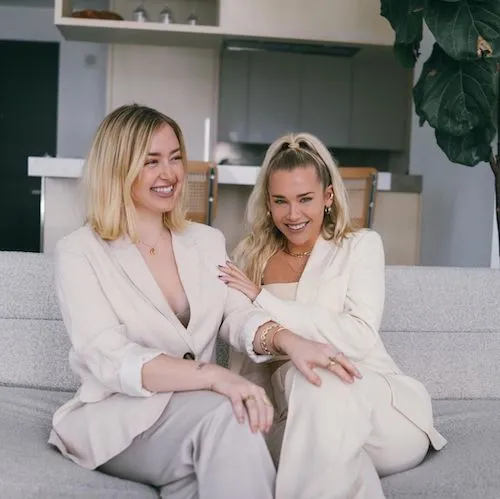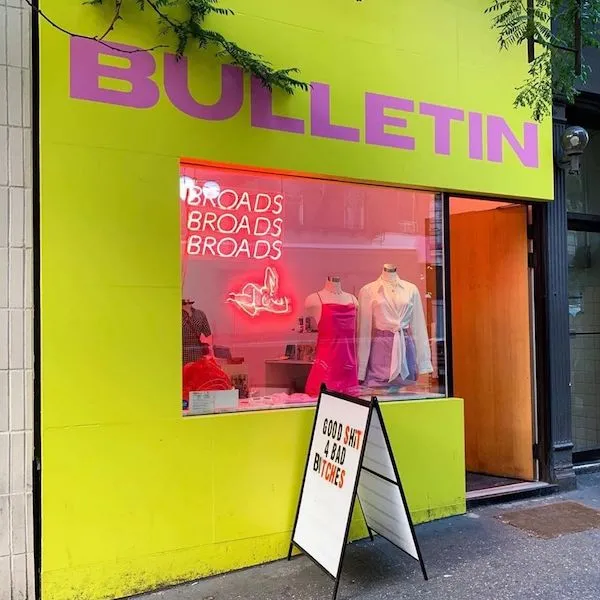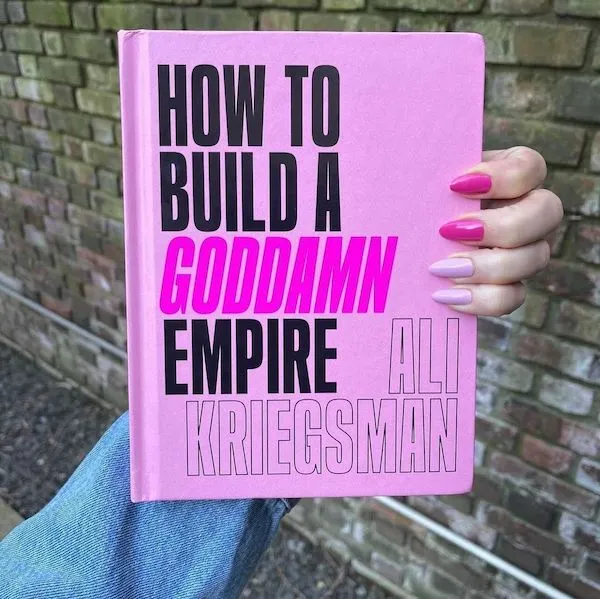The funding journey
Ali Kriegsman,
Co-founder of Bulletin
April 14, 2021
71% of entrepreneurs cite lack of access to capital as their number one barrier to starting up businesses. At IFW, we’re here to rewrite the code on how businesses get funded.
The Funding Journey is a series where we interview successful founders on the long, sometimes complicated, journey to raising capital for their businesses. In this edition, we interviewed Bulletin Co-founder and COO, Ali Kriegsman, on navigating the funding landscape as a woman.
Ali, tell us a little about yourself & Bulletin. How did this idea start? What problem did you set out to solve?

I started Bulletin in 2015 with my business partner and our CEO, Alana Branston. She and I were co-workers at a tech company at the time, and bonded over our obsession with all of the Brooklyn-based independent shops and brands.
Bulletin began as a newsletter and e-commerce site that spotlighted and sold products from independent designers that we hand-selected and interviewed for the platform. The goal was to establish a more streamlined, easy place to discover, meet, and shop the smaller brands that were getting drowned out by massive platforms like Etsy and Instagram.
We eventually launched our own pop-up market series—one that was more affordable and low-commitment than Long Island Flea or Smorgasburg. Brands paid a fee to sell at the market and kept 100% of sales. It was an amazing cash business and a ton of fun, but a lot of effort and manual labor! We set up and broke down a 40-vendor market every single weekend for almost a year.
Exhausted and looking for a more sustainable model, we took out a lease and brought our co-retailing model indoors. We scaled to three full-time locations at our peak, and ran a handful of pop-ups over the holiday seasons selling items from businesses exclusively. Brands paid a monthly membership fee to be in a Bulletin store and kept 70% of sales. We gave brands sales and customer feedback dashboard so they could assess their performance in real-time, which is unheard of in retail!
Ultimately, we wanted to help more brands, so we built and launched our own wholesale marketplace in late 2019. Our marketplace connects independent brands with thousands of retailers all around the United States and Canada who are looking for new brand partners and fresh inventory. Our services and solution has changed and evolved over the years, but our North Star has remained to help independent, small businesses build their empires, make more money, and grow. It’s an honor to wake up and do that every day!
In 2019, you and your team raised $7M in Series A funding. Can you walk us through your funding journey and how you got to where you are now, starting at the very beginning?
We bootstrapped the business for almost two years. From 2015 through the end of 2016, we used revenue from the business to fuel modest growth, and keep things going. We did a Y Combinator fellowship program in early 2016, resulting in a $20,000 grant, but otherwise, we used our previous commission checks and savings to stay afloat.
By early 2017, we were out of the markets and running our first two stores. We got into Y Combinator’s Core Batch Program, an accelerator program that helps refine your venture business model and connects you with investors after three months. It offered $150,000 in financing in exchange for 7% equity in our company. Then we were able to raise a seed round of about $2.2 million to expand and optimize our retail-as-a-service store business. The seed round allowed us to open five profitable stores over the course of two years.
By the end of 2018, we realized the solution we’d built wasn’t meeting the rising demand in the market. That’s why Bulletin’s affordable pay-to-play model was so attractive. We felt like there had to be a more affordable and straightforward digital solution to get brands into more retailers around the country.

We launched a “beta” version of our digital platform in late 2018. We amassed enough revenue and traction with this test to prove out the next iteration of Bulletin. We pinged our existing investor network, started sharing our data, our new direction, and hit the road to start pitching.
We got very lucky. An old investor acquaintance at Foundation Capital who visited our pop-up markets way back when was interested in reconnecting. He was really impressed with everything we’d accomplished with the pop-up markets and in the stores, he knew me and Alana pretty well, and he knew we understood this space and this customer. He was instrumental in getting us to our Series A. Foundation led the round with participation from our existing investors at Kleiner Perkins.
What were the unique challenges you have faced as a woman co-founder along the way? If so, can you speak to one specifically and how you overcame it?
You know, as a female founder or woman in the venture space, you do sometimes feel like the expectations are rigged. I feel like I can’t complain because candidly, there are so many people—men, women, investors, partners, employees—who have taken a chance on us, believed in us, and helped us continue to adapt and thrive. I feel lucky to be here and I feel extremely grateful for this opportunity.
But I guess that’s the unique challenge, right? You don’t want to rock the boat, call anyone out, or make a stink because you are one of so few, and you don’t want to stink up your chances, or the chances for other ambitious women in tech. My response to any sense of inequity is to always work harder, prove people wrong, and keep surviving in the face of adversity. However, as a woman founder, you do feel like there’s this much heavier burden of proof: to prove you’re worth the risk, to prove you have a strong and viable business, to prove you can scale and grow this thing.
A recent example I find absolutely hilarious and offensive is that we were approached by a strategic partner last year, during the pandemic. The guy leading the conversation kept asking if I would cook him dinner—literally. I joined one of our conference calls while making dinner, because I’m a busy bitch. (And a hungry one.) He thought it was funny to end every subsequent call with, “So, when are you cooking for me? When this deal is done, do I get dinner?” And when I say every subsequent call, I mean this happened almost every week for a few months. It wasn’t funny. But I felt like I had to fake laugh and seem chipper to move the deal forward—or at least not bludgeon it to death. Meanwhile, I kept wondering, “Would he ask a male founder this? Would he think it was funny to ask some male tech founder the same question?” I think we all know the answer to that. :-)
What piece of advice would you give to our community of entrepreneurs, largely women of color, who are in the early stages of scaling their businesses?
I would tell them to build a really strong support network.
I feel like I’m only starting to do that now, to be honest. I’ve always had my co-founder (Bulletin's CEO, Alana), and she’s always had me, but I think having other founders, hustlers, and entrepreneurs you can vent to, lean on, and come to for love and advice is very critical. Otherwise, it will feel like a very isolating and lonely journey. And it really doesn’t have to be.
You’re an author! Tell us about How to Build a Goddamn Empire, what’s next for Bulletin, and how folks can support you.

I am so, so excited about the book. You can purchase it here! How to Build a Goddamn Empire is the vulnerable, funny, no-bullsh*t book on entrepreneurship that I always wish existed, but could never actually find. As a first-time and inexperienced founder, I felt like I couldn’t relate to the glossy, glamorous entrepreneurs crowding my Instagram feed. In reality, I knew that building something from nothing is a confusing and emotional challenge you sign up for every single day. It's unglamorous, taxing, and endlessly stressful. It's a constant, dirty fight with your imposter syndrome and the intense fear that if things don’t work out, you've failed miserably. And publicly. While in the thick of scaling my business and a stressful pivot, I decided to write about my experience in real-time.
The book, which is a combination how-to guide and candid personal diary, was written from the trenches and from my heart and features stories from over 30 other female founders who have built companies of radically different stages and sizes. By using the questions I'm asked most frequently as guideposts, I offer candid insights into the nuts and bolts of building a brand from scratch—discussing early failures, picking the right co-founder, securing press, finding funding —to give entrepreneurs the tools that will help take their ideas to the next level. Most importantly, I am trying to help founders, and especially women, redefine the word "success" with every single chapter. My book argues that "success" has many faces—and sometimes learning, growing, and building something on your own terms makes you successful enough.
Ali Kriegsman is the Co-founder of Bulletin and the author of How to Build a Goddam Empire. Ali is currently doing a virtual book tour to promote the release of her new book. Follow along here.
Want to watch the full conversation and catch up on our past Funding Journeys? Follow us on Instagram.